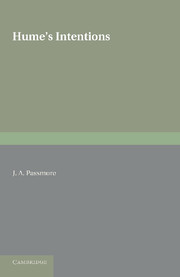Book contents
CHAPTER I - IN DEFENCE OF THE MORAL SCIENCES
Published online by Cambridge University Press: 05 June 2016
Summary
Hume is one of the most exasperating of philosophers. Each separate sentence in his writings—with very few exceptions—is admirable in its lucidity: the tangled syntax and barbarous locutions which bedevil the reader of Kant and Hegel are completely absent. And yet, although in a different way, Hume is at least as difficult as Hegel. In his editorial introduction to the Enquiries, Selby-Bigge summed up the Hume problem thus: ‘He says so many different things in so many different ways and different connexions, and with so much indifference to what he has said before, that it is very hard to say positively that he taught or did not teach this or that particular doctrine’. … This makes it easy to find all philosophies in Hume or, by setting up one statement against another, none at all.’
Faced with inconsistencies on this scale, the interpreter may proceed in one of a number of ways. Most boldly, he may denounce Hume's philosophy as a mere hotch-potch which has achieved its present reputation only because muddle and confusion have a fatal fascination—a conclusion which few have adopted but by which many more must have been tempted. Or, at the opposite extreme, he may argue that Hume's inconsistencies are but peccadillos, deriving in part from the tendency of innovators to fall back, in careless moments, upon the doctrines they have elsewhere demolished, in part from Hume's youthfulness; he had not acquired that mature cunning which teaches men to conceal their hesitations and to gloss over inconvenient facts. Neither of these methods of interpretation ought to be dismissed as merely absurd; the first reminds us that Hume was sometimes a very bad philosopher, whom no amount of piety can extenuate; the second, that in the writings of a youthful innovator accidental inconsistencies will be unusually frequent and blatant.
- Type
- Chapter
- Information
- Hume's Intentions , pp. 1 - 17Publisher: Cambridge University PressPrint publication year: 2013



